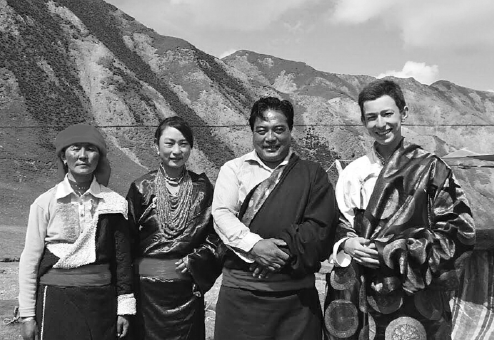 |
|
Max Horne (right) poses with his host family in traditional Tibetan clothing in the summer of 2016.[Photo provided to China Daily] |
Adventures in China
The classroom turned out to not be big enough for Horne's ambitions. In 2015, he visited China for the first time on a summer program.
"We went to Lijiang in Yunnan province and did a homestay with the Naxi ethnic people. We stayed in a small village called Ji Xiang Cun, which literally means 'a village of prosperity'," Horne told China Daily, in an interview conducted in both Chinese and English.
In that village, he studied Chinese in the morning and experienced the culture in the afternoon - learning about how they farm and take care of chickens - part of the Dongba culture, the Naxi people's distinct religious cultural and linguistic heritage.
"I still remember when the chickens and other livestock all broke out and ran toward us. We needed to get them back to the yard as soon as possible. That was fun," Horne chuckled, waving his arms to show how he helped gather the animals.
In the summer of 2016, Horne went on a monthlong study program to China's westernmost regions, including the Tibet autonomous region, Sichuan, Qinghai and Gansu provinces.
Instead of taking a nonstop flight, he bought a standing ticket for an 18-hour train ride to Tibet, and the kindness of strangers made an impression.
"During that trip, I ran out of food to eat and water to drink. When we got to a smaller village's train station, a man got on with some of his own produce ... a big cucumber. He broke it in half and gave me half of it, because he thought I was hungry and alone. I think that moment completely changed the train ride."
Horne started to talk with the passengers next to him and made friends. Some of them were migrant workers going back home; some were businesspersons going to western China.
"Whoever they were, they had a story to share," he said. "My ability to speak Chinese allowed me to hear their stories and share mine."
During that trip, Horne spent a few days in a remote nomadic area of Qinghai province to experience the region's Tibetan lifestyle, and he was struck by the local host family's hospitality.
"We took all of our meals on the floor of the tent, which they could tell I was not used to," Horne said. "Without my asking, they drove many kilometers to the nearest town to acquire a table and chairs just for my use. The family gave up their only available mattress for the duration of my stay to ensure that I could sleep comfortably."
Horne said they carried water up from a local stream in large jugs, "so that I might comfortably wash my face each morning and have ample water to drink".
"They gave me all that they had to give. It was enough - more than enough. It was wonderful."